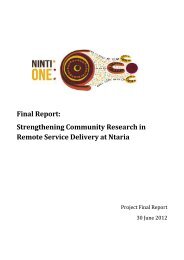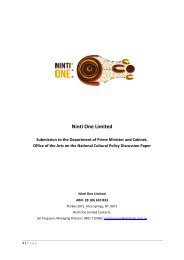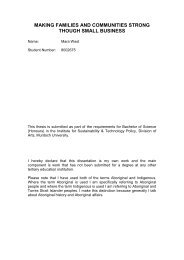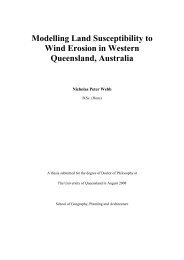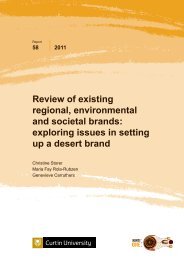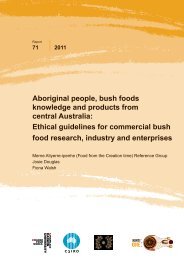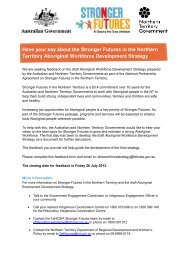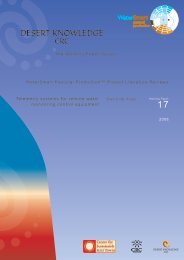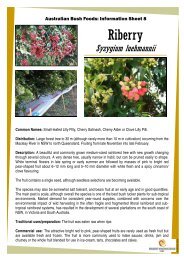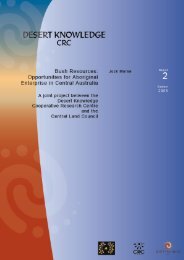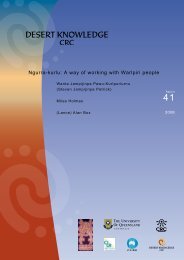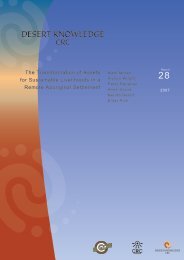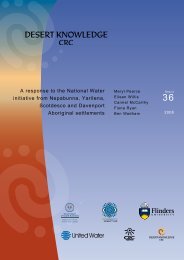What is Free Prior Informed consent?
What is Free Prior Informed consent? - CRC-REP
What is Free Prior Informed consent? - CRC-REP
You also want an ePaper? Increase the reach of your titles
YUMPU automatically turns print PDFs into web optimized ePapers that Google loves.
<strong>What</strong> <strong>is</strong> <strong>Free</strong> <strong>Prior</strong> <strong>Informed</strong> <strong>consent</strong>?Briefing Paper No. 7Plain language material<strong>Free</strong> <strong>Prior</strong> <strong>Informed</strong> Consent <strong>is</strong> an important part of ethical researchwith people. If you give <strong>consent</strong> then you are saying ‘yes’ to theresearch; that <strong>is</strong>, you are giving perm<strong>is</strong>sion for it to be done, or foryour participation. If you deny <strong>consent</strong>, then you are saying ‘no’.There may also be some stages in between ‘yes’ and ‘no’, which mean that you want theresearchers to give you more information, or more time, before you can make a dec<strong>is</strong>ion. Your<strong>consent</strong> can be withdrawn at any time during the research.<strong>Free</strong> <strong>Prior</strong> <strong>Informed</strong> Consent <strong>is</strong> also part of Aboriginal and Torres Strait Islander people’s right toself-determination, in that it <strong>is</strong> a process that recogn<strong>is</strong>es their right to make informed dec<strong>is</strong>ionsabout matters that affect them, their communities and their lands.<strong>Free</strong> <strong>Prior</strong> <strong>Informed</strong> Consent <strong>is</strong> developing as a standard in international law (for example, in theUnited Nations Convention on Biological Diversity).Before a research project or development activity can begin, the researcher/s must explain in asmuch detail as necessary all aspects of the research project. They must provide clear andaccessible information to the community, and they must be certain that the people they are workingwith understand all about it. Once the people in the community have understood what the purposeand value of the research <strong>is</strong> to them and their community (th<strong>is</strong> could take several v<strong>is</strong>its by theresearcher/s) they can then decide if they want to say yes or no to being involved in it. Th<strong>is</strong> must bedone freely, that <strong>is</strong>, without being pushed by the researcher.It <strong>is</strong> important that <strong>consent</strong> <strong>is</strong> given prior to the research starting; that <strong>is</strong>, before the researchbegins. Th<strong>is</strong> happens on two levels. First, if a researcher wants to work with people from acommunity, before approaching an individual they should already have the <strong>consent</strong> of thecommunity council or community organ<strong>is</strong>ation that looks after such things. They may have alreadynegotiated a Research Protocol (see ‘Aboriginal and Torres Strait Islander Research EngagementProtocol’ and Briefing Paper No. 6). Only after th<strong>is</strong> has been done will the researcher/s thenapproach a person to ask them questions and ask them to be involved in the research. At th<strong>is</strong> stagethe researcher will, in most cases, have a form that they might ask the research participant to fill outPage 1
and sign. If a form <strong>is</strong>n’t offered, then research participants can ask for one. Th<strong>is</strong> form <strong>is</strong> called a<strong>Free</strong> <strong>Prior</strong> <strong>Informed</strong> Consent form. It should explain something about the research, talk aboutconfidentiality (see Briefing Paper No. 8) and describe how the participant or research collaboratorwill benefit from the research. Th<strong>is</strong> benefit might be both for the individual, through payment forresearch ass<strong>is</strong>tance, and more broadly for the community, as the research may ass<strong>is</strong>t in developinggood policy, for instance.The researcher has an obligation to ensure that the research participants are informed about whythe research <strong>is</strong> happening in their community, why their participation <strong>is</strong> sought and what the benefitsare to them and to the community.Consent <strong>is</strong> when the research participant says ‘yes’ to participating in the research. However, th<strong>is</strong>doesn’t mean that research participants can’t later say ‘no’, and ask the researcher/s to leave if theyare unhappy with how the researcher <strong>is</strong> working with them or the community. They may w<strong>is</strong>h torenegotiate the terms and conditions of the project, or seek more details about aspects of theresearch (such as how, and in what forms the research results will be made available and for whatpurposes). Consent can be withdrawn or changed at any time during the research. In th<strong>is</strong> way,<strong>consent</strong> <strong>is</strong> ongoing for the life of the project, as a process, and <strong>is</strong> not a one-off event that occurswhen research participants sign a form.How prior informed <strong>consent</strong> works for the rights of Aboriginal and Torres Strait IslanderpeopleIn setting out to develop any research or development project, there <strong>is</strong> often a protocol oragreement that <strong>is</strong> signed by the major parties to the research (these parties might cons<strong>is</strong>t of thelocal council or Aboriginal or Torres Strait Islander representative body, Aboriginal or Torres StraitIslander researchers and university researchers). Aboriginal and Torres Strait Islander people needto make sure they are equal partners at all stages in the negotiation processes.Aboriginal and Torres Strait Islander people also need to make sure that they have their rights tofree, prior informed <strong>consent</strong> recogn<strong>is</strong>ed and upheld in the contracts and agreements. A goodcontract or agreement will contain prov<strong>is</strong>ions setting out, in detail, the rights, responsibilities andobligations to ensure Aboriginal and Torres Strait Islander people maintain their full and effectiverights to participation, negotiation, and dec<strong>is</strong>ion making at all stages and levels in the project.Selected referencesAustralian Institute of Aboriginal and Torres Strait Islander Studies. 2011. Guidelines for EthicalResearch in Indigenous Studies. Australian Institute of Aboriginal and Torres Strait IslanderStudies. Canberra.Page 2
Fourmile H. 1998. Using <strong>Prior</strong> <strong>Informed</strong> Consent Procedures under the Convention on BiologicalDiversity to Protect Indigenous Traditional Ecological Knowledge and Natural ResourceRights. Indigenous Law Bulletin, Vol. 4 (16), pp. 14–17.Smallacombe S, Dav<strong>is</strong> M, Quiggin R, Chr<strong>is</strong>tie M, Craig D, Cronin D, Davies J, Dav<strong>is</strong> M, Douglas J,Duffy M, Edwards T, Evans L, Guy J, Jordon L, Muir K, Raven M, Rea K and Sherwood J.2007. Scoping Project on Aboriginal Traditional Knowledge. DKCRC Research Report 22.Desert Knowledge CRC. Alice Springs.Page 3



